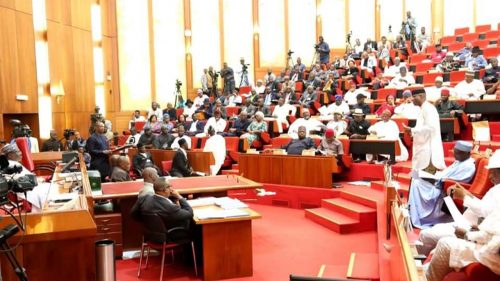The Nigerian Senate has passed the Finance Bill.
The bill, which was presented to the National Assembly by President Muhammadu Buhari in October, seeks to increase the value-added tax (VAT) from five per cent to 7.5 per cent.
If signed into law, Nigerians will pay more for specific goods and services that attract VAT.
The bill will also reform the tax regime by amending several Acts, namely Petroleum Proflt Tax Act (PPT), Custom and Excise Tax Act, Company Income Tax Act (CITA), Personal Income Tax Act, Value Added Tax Act, Stamp Duties Tax Act, and Capital Gains Act.
The Finance Bill had on November 6 passed the second reading despite lawmakers not being fully aware of its content.
No copies of the bill were shared to senators to allow for any meaningful contribution before it was debated and passed.
The Nigerian Senate held a public hearing on the bill on Tuesday. The public hearing was organised by the Senate Committee on Finance.
For the pubic hearing, relevant persons were invited to discuss their reservations and their recommendations about the bill. Details of the bill was also made available to those invited.
The bill was passed Thursday after lawmakers considered it clause-by-clause following the submission of a report by the finance committee.
The Senate will now expect a concurrence by the House of Representatives before the legislation goes to the president for signing.
Presenting the report of the committee, the chairman, Solomon Adeola, explained that the bill will amend six tax provisions and make them more responsive to tax reform policies.
The bill will also amend one tax provision of the Customs and Excise Tariff Act to encourage local manufacturers. This, he said, will subject certain imported goods to excise duties in a similar manner as their locally manufactured counterpart.
The seven Acts amended under the Finance Bill 2019 contain 56 Clauses.
He said one major objective of the bill is to raise revenue for the government.
Other objectives include promote fiscal equity by mitigating instances of regressive taxation, reform domestic tax laws to align with global best practices, introduce tax incentives for investment in infrastructure and capital markets and support small businesses in line with the on-going “Ease of Doing Business Reforms.
He said based on the public hearing, the bill was a welcome development and the consensus view was that its proposals and principles should be sustained.
The lawmaker, therefore, recommended that the Executive should be encouraged to propose to the National Assembly, Finance Bills to support the fiscal policies of the annual budget and should also sustain this initiative as an annual tradition.
The committee also recommended that the proposed amendments to the finance bill be approved by the Senate.
The Senate Leader, Abdullahi Yahaya, said the bill will improve the nation’s economy. He therefore urged his colleagues to look at the bill in a non-partisan way and consider it.

